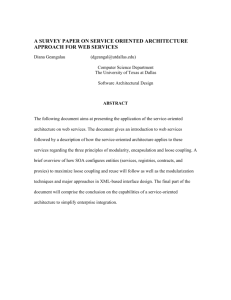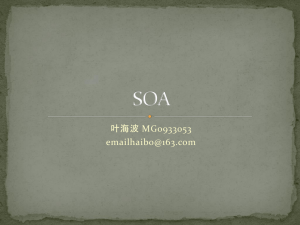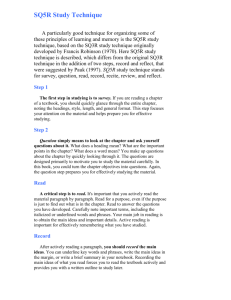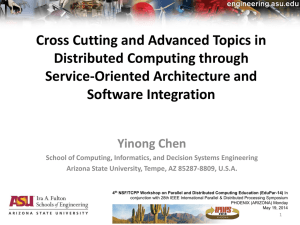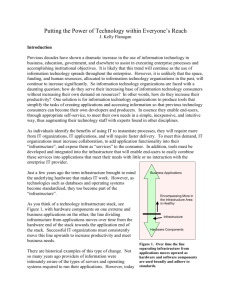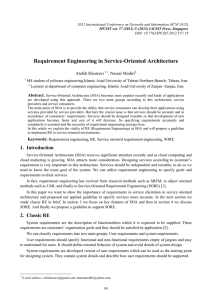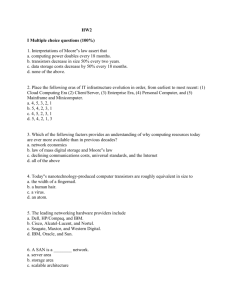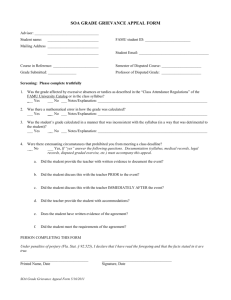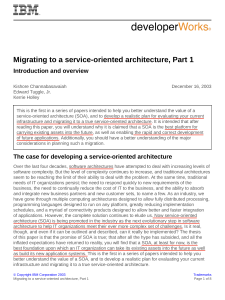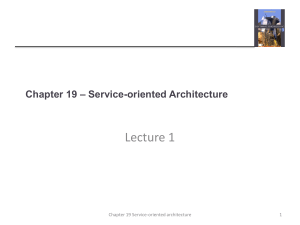TINFO 490 Syllabus - University of Washington
advertisement
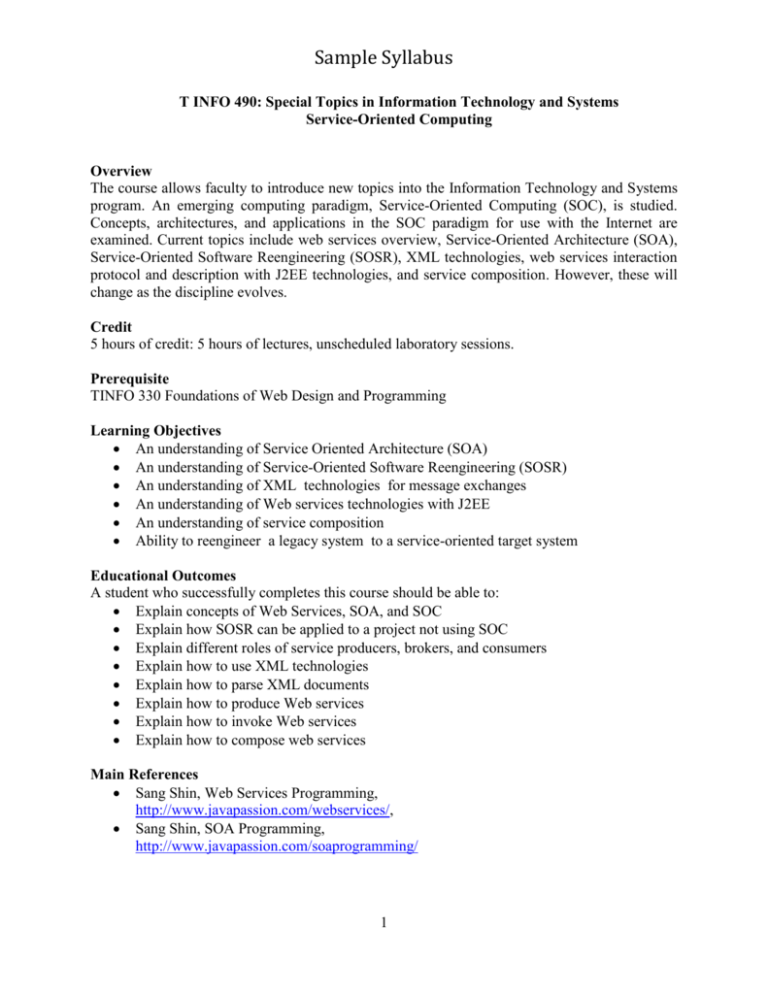
Sample Syllabus T INFO 490: Special Topics in Information Technology and Systems Service-Oriented Computing Overview The course allows faculty to introduce new topics into the Information Technology and Systems program. An emerging computing paradigm, Service-Oriented Computing (SOC), is studied. Concepts, architectures, and applications in the SOC paradigm for use with the Internet are examined. Current topics include web services overview, Service-Oriented Architecture (SOA), Service-Oriented Software Reengineering (SOSR), XML technologies, web services interaction protocol and description with J2EE technologies, and service composition. However, these will change as the discipline evolves. Credit 5 hours of credit: 5 hours of lectures, unscheduled laboratory sessions. Prerequisite TINFO 330 Foundations of Web Design and Programming Learning Objectives An understanding of Service Oriented Architecture (SOA) An understanding of Service-Oriented Software Reengineering (SOSR) An understanding of XML technologies for message exchanges An understanding of Web services technologies with J2EE An understanding of service composition Ability to reengineer a legacy system to a service-oriented target system Educational Outcomes A student who successfully completes this course should be able to: Explain concepts of Web Services, SOA, and SOC Explain how SOSR can be applied to a project not using SOC Explain different roles of service producers, brokers, and consumers Explain how to use XML technologies Explain how to parse XML documents Explain how to produce Web services Explain how to invoke Web services Explain how to compose web services Main References Sang Shin, Web Services Programming, http://www.javapassion.com/webservices/, Sang Shin, SOA Programming, http://www.javapassion.com/soaprogramming/ 1 Sample Syllabus Required Papers (PDF files are provided.) Web Services o [WS1] Inderjeet Singh, Sean Brydon, Greg Murray, Vijay Ramachandran, Thierry Violleau, and Beth Stearns, Chapter 1: Introduction, Designing Web Services with the J2EE(TM) 1.4 Platform: JAX-RPC, SOAP, and XML Technologies, Sun Microsystems Inc., 2004. Service Oriented Computing (SOC) o [SOC1] Mike P. Papazoglou1, Paolo Traverso, Schahram Dustdar, Frank Leymann, Service-Oriented Computing Research Road Map was published as Service-Oriented Computing: State of the Art and Research Challenges, IEEE Computer, Vol. 40, Issue 11, November 2007. pp. 38-45. Service-Oriented Software Engineering (SOSE) o [SOSE1] Chikofsky, E. J., Cross, H. J, II. (1990). Reverse Engineering and Design Recovery: A Taxonomy. IEEE Software Vol. 7, No. 1. Jan. 1990. pp. 13-17. o [SOSE2] Kruchten, P. B. (1995). The 4+1 View Model of Architecture. IEEE Software, 12 (6), pp. 42 – 50. o [SOSE3] H. Correa, Introduction to Scrum, CoDe Magazine, July 18, 2009. o [SOSE4] M. Stephens, and D. Rosenberg, “The Irony of Extreme Programming”, Dr. Dobb’s. May 01, 2004. o [SOSE5] D. Rosenberg and K. Scott, Introduction to the ICONIX Process of Software Modeling. Oct 12, 2001. o [SOSE6] Sam Chung, Daehee Won, Seung-Ho Baeg, Sangdeok Park, A Model-Driven Scrum Process for Service-Oriented Software Reengineering: mScrum4SOSR, The 2nd International Conference on Computer Science and its Applications (CSA 2009), December 10-12, 2009, Jeju Island, Korea. o [SOSE7] Sam Chung, Daehee Won, Seung-Ho Baeg, Sangdeok Park, Service-Oriented Reverse Reengineering: 5W1H Model-Driven Re-Documentation and Candidate Services Identification, IEEE International Conference on Service-Oriented Computing and Applications (SOCA’09) December 14-15, 2009, Taipei, Taiwan. Service Composition o [SC1] Milanovic, N. and Malek, M. (2004), Current Solutions for Web Service Composition. IEEE Internet Computing. 8 (6) pp. 51 – 59. o [SC2] Sam Chung, Sergio Davalos, Craig Niiyama, Daehee Won, Seung-Ho Baeg, Sangdeok Park, A UML Model-Driven Business Process Development Methodology for a Virtual Enterprise using SOA & ESB, 2009 IEEE Asia-Pacific Services Computing Conference (IEEE APSCC 2009). December 7-11, 2009, Biopolis, Singapore. Grading and Evaluation Grades in the course will be determined as follows: Quiz (without any notice) Lab Assignments to be familiar with technologies Lab 01: Setting up Your Development Environment Lab 02: Understanding the Roles of Service Consumer Lab 03: Burndown Chart for Your term Project Lab 04: XML Namespace, DTD, XSD 2 10% 40% 4% 4% 4% 4% Sample Syllabus Lab 05: XPath & XSLT Lab 06: JAXP Lab 07: SOAP & WSDL Lab 08: JAX-WS Lab 09: BPEL 4% 4% 4% 4% 8% Term Project: SOSR Case Study Abstract Progress Report Progress Presentation (Peer Evaluation) Final Demo & Presentation (Peer Evaluation) Final Report 40% 5% 5% 5% 15% 10% Reviewing Your Classmate’s SOSR Case Studies Reviewing a Classmate’s Abstract (Peer Review) Reviewing a Classmate’s Progress Report (Peer Review) Reviewing a Classmate’s Final Report (Peer Review) 10% 2% 3% 5% Total Bonus (Class participation, maximum) 100% 5% Course Conduct Students are encouraged to attend classes or arrange absences in advance. The class is divided into several teams for in-class group discussions, assignments, and one term project. Each student must read the assigned readings and be prepared to discuss them in class. Also, each student/team will have a group discussion time to share their learning in class. To aid the learning process, students are required to participate in group discussion. The success of the course is largely determined by the quality of the interactions. Class participation will be respected according to their logical contents rather than personal opinions. Students are advised to think carefully through the implications of their position in advance of contributing to the discussion. Quizzes (10%, group) o To check your follow-up such as reviewing lecture notes, reading materials, demo cases, review questions, and labs, you will take several quizzes without giving any notice in advance as long as the lecture progress is allowed. o If you miss a quiz without giving any notice in advance, you will receive 0 point. o Based upon the professor’s experiences, four or five quizzes may be taken. (Short) Lab Assignments (40%) o You will be familiar with technologies through labs with short experiments. o No source code can be shared. However, discussions with your classmates are encouraged. Term Project: SOSR Case Study (40%) o Each student will conduct a reengineering project that modernizes a legacy system to target systems using the SOC paradigm. 3 Sample Syllabus o The legacy system will be reengineered by using simple Web services. And then, the target system will be further modernized by using composite services. o 5W1H re-documentation technique will be used for visualizing your legacy and target systems. o Model-driven Scrum will be used for managing your project. Reviewing Your Classmate’s SOSR Case Study (10%) o Each student will review abstracts, progress reports, and final reports of two other classmates. o You will submit the peer review results to the professor. o If you did not receive the review result of a reviewer by a certain due date and cannot submit the result, the reviewer will receive 0 point. Bonus (maximum 5%) o If you are actively engaged in classroom discussions, helping other students who have difficulty in finishing their labs, making typo errors of documents, or improving the quality of the documents, you can get a bonus up to 5 points. Please do not count on the total score of LMS (Moodle) as your EXACT final one due to the different weights on each grade item. Grading Policy Undergraduate students must earn 2.0 or greater. Grade GPA Score Grade GPA Score Grade GPA Score A 4.0 98-100 B+ 3.4 84-86 C+ 2.4 59-61 3.9 96-97 3.3 82-83 2.3 3.8 94-95 3.2 79-81 3.7 91-93 3.1 77-78 3.6 90 3.0 3.5 87-89 A- B B- GPA Score 1.4 34-36 57-58 1.3 32-33 2.2 54-56 1.2 29-31 2.1 52-53 1.1 26-28 75-76 2.0 48-51 1.0 24-25 2.9 72-74 1.9 47 0.9 21-23 2.8 69-70 1.8 44-46 0.8 20 2.7 67-68 1.7 42-43 0.7 18 2.6 64-66 1.6 39-41 0.0 <18 2.5 62-63 1.5 37-38 C C- Grade D+ D D- E Academic Standards Both the value and the success of any academic activity, as well as the entire academic enterprise, have depended for centuries on the fundamental principle of absolute honesty. Students assume full responsibility for the content and integrity of the academic work that they submit. Although students are encouraged to discuss ideas and analyses with others, individual written assignments must reflect only the individual’s efforts. Reference citations must be used correctly to credit another person’s ideas. 4 Sample Syllabus A complete list of Academic Standards is published in the University of Washington Tacoma Catalog. A student who violates Academic Standards for an assignment will receive no credit for that assignment. Course Web Site & Tentative Course Schedule The professor will maintain the course web site. Course related resources such as syllabus, schedule, assignments, old exams, etc, will be linked to the web site. According to the course progress, the web site may be updated without giving enough notice in advance: https://moodle.insttech.washington.edu/ In addition, the schedule and procedures for this course are subject to change. Changes will be announced in class and it is the student's responsibility to learn and adjust to changes. Disability Support Services If you would like to request academic accommodations due to a temporary or permanent disability, contact Disability Support Services (DSS) in the Mattress Factory Bldg., Room 253. To schedule an appointment, call 253.692.4522. You are required to provide adequate documentation of your disability to DSS to receive services. For more information see: http://www.tacoma.washington.edu/studentaffairs/SHW/dss_about.cfm 5
